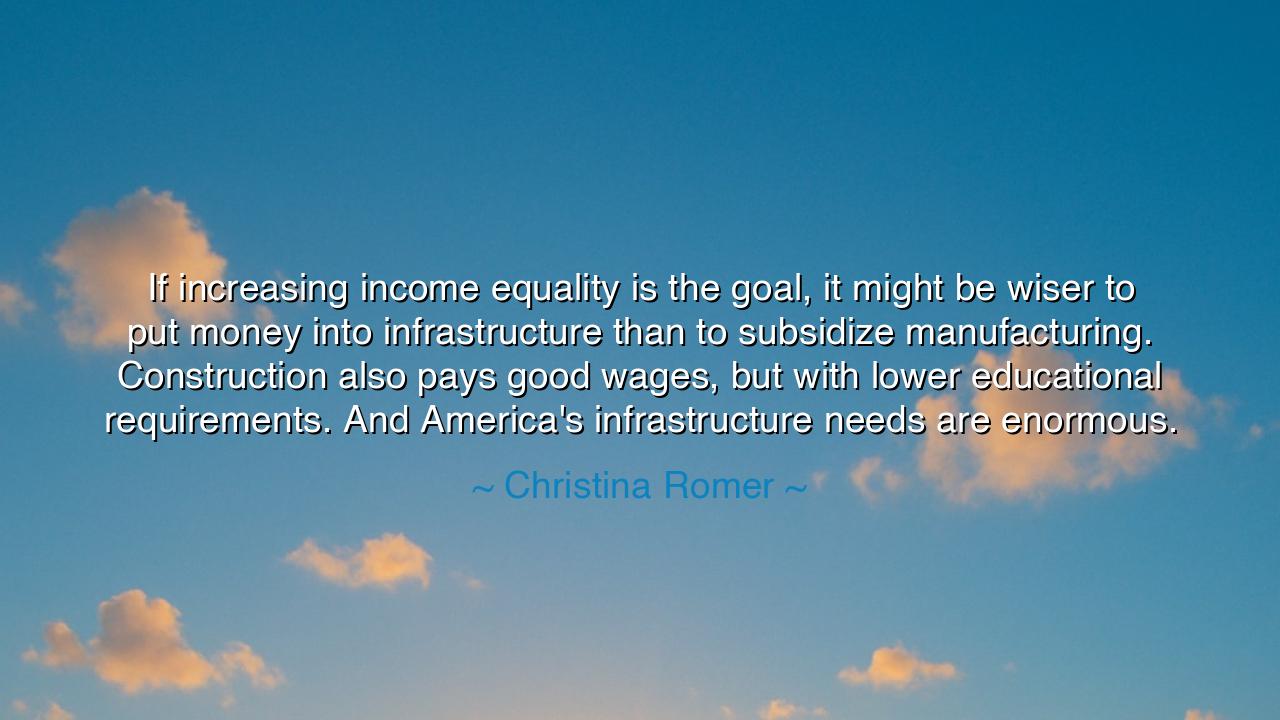
If increasing income equality is the goal, it might be wiser to
If increasing income equality is the goal, it might be wiser to put money into infrastructure than to subsidize manufacturing. Construction also pays good wages, but with lower educational requirements. And America's infrastructure needs are enormous.






In the great passage of time, where the rise and fall of empires and nations are measured not only by their conquests but by their prosperity and the well-being of their people, there emerges a profound truth about the role of resources in shaping a society. Christina Romer, with the clarity of a seasoned thinker, speaks to us with wisdom: "If increasing income equality is the goal, it might be wiser to put money into infrastructure than to subsidize manufacturing. Construction also pays good wages, but with lower educational requirements. And America's infrastructure needs are enormous." In these words, she points us toward a crucial understanding of how nations can foster a more just society, one where wealth is shared more equitably, not just through subsidies, but through investments that build the very foundations of the nation itself.
The call to prioritize infrastructure over manufacturing challenges the assumptions that often guide economic policy. Romer suggests that the key to income equality lies not merely in bolstering industries that require a highly specialized workforce, but in investing in the very structures that serve everyone—the roads, the bridges, the schools, and the public works that form the skeleton of a thriving society. In ancient times, the great civilizations understood that the strength of an empire lay not only in its military might or its economic prowess but in its ability to connect its people and resources. Rome, for example, built an empire not just with swords but with roads and aqueducts that enabled the efficient movement of goods, people, and ideas. Through this infrastructure, they laid the foundation for a civilization that lasted centuries.
Yet, Romer’s insight goes deeper than the mere creation of physical structures; it is a call to recognize the value of work that is often overlooked in the pursuit of high-tech industries and elite jobs. Construction, as she notes, pays good wages and requires fewer educational barriers, making it accessible to a broader swath of society. In this way, investing in infrastructure does not just build a nation but uplifts its people, giving them the tools to participate in the economic life of the nation. The ancient Greeks, despite their emphasis on philosophy and higher learning, also recognized the necessity of practical labor in sustaining their cities. Pericles, the great Athenian leader, oversaw the construction of the Parthenon and other monumental works that not only symbolized the glory of Greece but provided employment and purpose for many citizens.
Romer’s call also challenges us to think beyond the immediate returns of financial investments. Infrastructure is the long-term investment that pays dividends for generations. Look at the example of the United States in the 19th century, when the construction of the Transcontinental Railroad connected the East and West coasts, opening new avenues for trade, communication, and settlement. It was a monumental investment in infrastructure, one that spanned decades, yet its returns were immeasurable, transforming the nation and cementing its place as a global power. The railroads allowed goods to move across vast distances, connected families, and opened up the West to economic development. The benefits were not immediate, but they were transformative.
Moreover, Romer’s suggestion acknowledges that economic inequality is not solely about the number of jobs or the income generated but about the accessibility of those opportunities. While subsidizing manufacturing can lead to higher wages in specific sectors, it often creates barriers for those who do not have the education or skills to access these jobs. By investing in infrastructure, however, we create job opportunities for a wider range of individuals, from skilled laborers to engineers, each contributing to the greater good. This was evident during the New Deal era of the 1930s when Franklin D. Roosevelt spearheaded a series of public works projects that not only helped to pull America out of the Great Depression but also created lasting infrastructure that continues to benefit the nation today.
The lesson we must draw from Romer’s insight is profound: equality is not merely about increasing the wages of those at the top or providing handouts to specific industries. It is about creating a society where the opportunities for meaningful, well-paid work are available to all, where the foundation of prosperity is built on the very infrastructure that sustains life itself. This is an investment that requires foresight, patience, and an understanding that the workforce is not just a collection of skilled individuals, but a network of people whose potential can be unlocked through access to opportunities and tools.
Let us, then, take Romer’s words into our own hearts. Let us advocate for policies that focus not just on immediate profits but on the long-term health of our societies. Invest in the infrastructure that connects us—whether through roads, public transit, schools, or the internet—and provide opportunities for all to rise. The road to equality is not just through handouts but through the collective efforts of building a world where every individual, no matter their background or education, can contribute meaningfully to the growth of society. In this, we honor not just the power of the economy but the potential of humanity to work together toward a common good.






AAdministratorAdministrator
Welcome, honored guests. Please leave a comment, we will respond soon